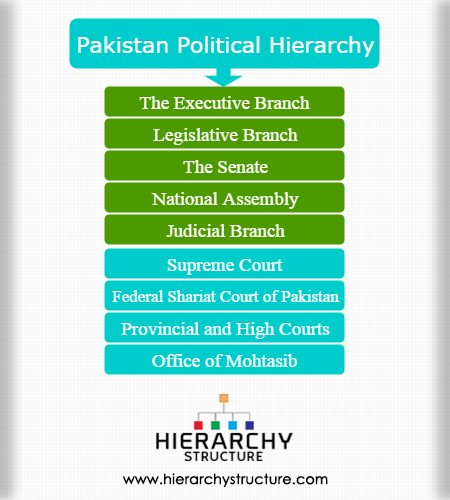The politics in Pakistan takes place according to the constitution and the country classifies itself as a nation state in South Asia. Islam is the main religion in the country which is a federal parliamentary republic. According to the rules set by the constitution, the politics of the country is divided into three branches including executive, legislative and judicial.
The hierarchical structure of Pakistan politics helps in the separation of power and in the balanced rule and governance. If you wish to understand the hierarchy of Pakistan politics, you can go through the information given below.
The executive branch
It is the prime minister of Pakistan who heads the executive government which is independent from the state parliament. The president is also part of the executive branch and is elected for a five term by an electoral college which consists of members of the national assembly and the senate. It also consists of the members of the provincial assemblies. The president acts on the advice of the prime minister but holds the main residual powers in the country and within this branch.
Legislative branch
The legislative branch consists of the senate and the national assembly. The senate is the upper house and the national assembly is the lower house.
The senate
The senate is basically a permanent legislative body the chairman of which is next in line to act as the president. The senate has equal representation from each of the four provinces who are elected by the members of the provincial assemblies. There are representatives in the senate from the federally administered tribal areas as well as from the Islamabad capital territory.
National assembly
The members of this assembly are voted in by the universal adult suffrage. The members of this assembly serve for 5 years.
Judicial branch
The judiciary in Pakistan consists of the Supreme Court, high courts of provinces, sessions and district courts, magistrate and civil courts. Some other small courts too function in provinces. Let’s read about the judicial branch political hierarchy in Pakistan:
Supreme court
The Supreme Court is the highest level court in the country and has original, appellate and advisory jurisdiction. This court is headed by the chief justice who is appointed by the president. The chief justice as well as the other judges of the Supreme Court can remain in office till the age of 68.
Federal shariat court of Pakistan
The Federal shariat court of Pakistan has the power to examine and find out whether the laws of country go in sync with the Shari’a law. It has 8 judges who are appointed by the president after consultation from the chief justice of this court.
Provincial and high courts
Every district has one high court and several provincial courts which are basically the special courts and tribunals that deal with special kinds of cases.
Office of Mohtasib
This is a feature of the judicial system of Pakistan which is provided for by the constitution. An office of Mohtasib is established in every Muslim state to ensure nothing wrong is done to the people.
Also Know about Pakistan Police Hierarchy.

